| Listing 1 - 9 of 9 |
Sort by
|
Book
Year: 2015 Publisher: Chicago : University of Chicago Press,
Abstract | Keywords | Export | Availability | Bookmark
 Loading...
Loading...Choose an application
- Reference Manager
- EndNote
- RefWorks (Direct export to RefWorks)
Differences among religious communities have motivated-and continue to motivate-many of the deadliest conflicts in human history. But how did political power and organized religion become so thoroughly intertwined? And how have religion and religiously motivated conflicts affected the evolution of societies throughout history, from demographic and sociopolitical change to economic growth? War, Peace, and Prosperity in the Name of God turns the focus on the "big three monotheisms"-Judaism, Islam, and Christianity-to consider these questions. Chronicling the relatively rapid spread of the Abrahamic religions among the Old World, Murat Iyigun shows that societies that adhered to a monotheistic belief in that era lasted longer, suggesting that monotheism brought some sociopolitical advantages. While the inherent belief in one true god meant that these religious communities had sooner or later to contend with one another, Iyigun shows that differences among them were typically strong enough to trump disagreements within. The book concludes by documenting the long-term repercussions of these dynamics for the organization of societies and their politics in Europe and the Middle East.
Economics --- Monotheism --- Religion and politics --- Religious aspects --- History. --- Influence. --- ottoman empire, europe, god, christianity, religion, judaism, islam, war, peace, prosperity, community, conflict, pluralism, tolerance, jihad, politics, history, power, spirituality, abrahamic religions, conversion, expansion, nonfiction, monotheism, middle east, faith, competition, charlemagne, mohammed, crusades, moors, gaza, papacy, pope, infidel, ferdinand, charles, francis, monarchy, royalty, ethnicity, race, austria-hungary, protestant reformation, harem.
Book
ISBN: 1400889707 9781400889709 0691181039 Year: 2018 Publisher: Princeton, NJ : Princeton University Press,
Abstract | Keywords | Export | Availability | Bookmark
 Loading...
Loading...Choose an application
- Reference Manager
- EndNote
- RefWorks (Direct export to RefWorks)
F.E. Peters, a scholar without peer in the comparative study of Judaism, Christianity, and Islam, revisits his pioneering work. Peters has rethought and thoroughly rewritten his classic The Children of Abraham for a new generation of readers-at a time when the understanding of these three religious traditions has taken on a new and critical urgency.He began writing about all three faiths in the 1970s, long before it was fashionable to treat Islam in the context of Judaism and Christianity, or to align all three for a family portrait. In this updated edition, he lays out the similarities and differences of the three religious siblings with great clarity and succinctness and with that same remarkable objectivity that is the hallmark of all the author's work.Peters traces the three faiths from the sixth century B.C., when the Jews returned to Palestine from exile in Babylonia, to the time in the Middle Ages when they approached their present form. He points out that all three faith groups, whom the Muslims themselves refer to as "People of the Book," share much common ground. Most notably, each embraces the practice of worshipping a God who intervenes in history on behalf of His people.The book's text is direct and accessible with thorough and nuanced discussions of each of the three religions. Footnotes provide the reader with expert guidance into the highly complex issues that lie between every line of this stunning edition of The Children of Abraham. Complete with a new preface by the author, this Princeton Classics edition presents this landmark study to a new generation of readers.
Judaism --- Christianity. --- Islam --- Mohammedanism --- Muhammadanism --- Muslimism --- Mussulmanism --- Religions --- Muslims --- Christianity --- Church history --- Jews --- Semites --- History --- Religion --- Al-Ghazali. --- Apostasy. --- Apostolic Tradition. --- Asceticism. --- Avicenna. --- Bible. --- Caliphate. --- Canon law. --- Chosen people. --- Christ. --- Christian theology. --- Christian tradition. --- Christian. --- Christianity and Judaism. --- Christology. --- Church Fathers. --- Creed. --- Crucifixion of Jesus. --- Deity. --- Ecumenical council. --- Ekklesia (think tank). --- Essene. --- Essenes. --- Eucharist. --- Exegesis. --- Galilean. --- Gentile. --- Gnosticism. --- God. --- Hadith. --- Hebrew Bible. --- Heresy. --- Ideology. --- Ijtihad. --- Infidel. --- Islam. --- Israelites. --- Jewish Christian. --- Jewish prayer. --- Jews. --- Judaism. --- Judea (Roman province). --- Justification (theology). --- Kaaba. --- Kabbalah. --- Kafir. --- Kalam. --- Khawarij. --- Kohen. --- Law of Moses. --- Liturgy. --- Maimonides. --- Messiah in Judaism. --- Midrash. --- Mishnah. --- Mitzvah. --- Monotheism. --- Mosque. --- Muslim. --- Mysticism. --- New Covenant. --- New Testament. --- Old Testament. --- Paganism. --- Passover. --- People of the Book. --- Pharisees. --- Philosophy. --- Piety. --- Prophecy. --- Quran. --- Quraysh. --- Rabbinic Judaism. --- Recitation. --- Religion. --- Religious community. --- Religious text. --- Renunciation. --- Ritual purification. --- Sadducees. --- Sect. --- Sermon. --- Shafi'i. --- Sharia. --- Shia Islam. --- Spirituality. --- Sufism. --- Sunni Islam. --- Tafsir. --- Talmud. --- Theology. --- Torah in Islam. --- Torah. --- Ulama. --- Ummah. --- Veneration. --- Worship. --- Writing. --- Yahweh.
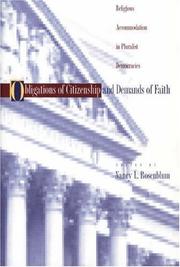
ISBN: 069100708X 0691007071 0691228248 Year: 2000 Publisher: Princeton, N.J. Princeton University Press
Abstract | Keywords | Export | Availability | Bookmark
 Loading...
Loading...Choose an application
- Reference Manager
- EndNote
- RefWorks (Direct export to RefWorks)
Of the many challenges facing liberal democracy, none is as powerful and pervasive today as those posed by religion. These are the challenges taken up in Obligations of Citizenship and Demands of Faith, an exploration of the place of religion in contemporary public life. The essays in this volume suggest that two important shifts have altered the balance between the competing obligations of citizenship and faith: the growth of religious pluralism and the escalating calls of religious groups for some measure of autonomy or recognition from democratic majorities. The authors--political theorists, philosophers, legal scholars, and social scientists--collectively argue that more room should be made for religion in today's democratic societies. Though they advocate different ways of carving out and justifying the proper bounds of "church and state" in pluralist democracies, they all write from within democratic theory and share the aim of democratic accommodation of religion. Alert to national differences in political circumstances and the particularities of constitutional and legal systems, these contributors consider the question of religious accommodation from the standpoint of institutional practices and law as well as that of normative theory. Unique in its interdisciplinary approach and comparative focus, this volume makes a timely and much-needed intervention in current debates about religion and politics. The contributors are Nancy L. Rosenblum, Alan Wolfe, Ronald Thiemann, Michael McConnell, Graham Walker, Amy Gutmann, Kent Greenawalt, Aviam Soifer, Harry Hirsch, Gary Jacobsohn, Yael Tamir, Martha Nussbaum, and Carol Weisbrod.
Political philosophy. Social philosophy --- #A0309PSA --- Citizenship --- Democracy --- Religion and politics. --- Religious aspects. --- Religion and politics --- Political science --- Politics, Practical --- Politics and religion --- Religion --- Religions --- Religious aspects --- Political aspects --- Democratie --- Religion et politique. --- Aspect religieux. --- Activism. --- Alan Wolfe. --- Amendment. --- Americans. --- Attempt. --- Baptists. --- Buddhism. --- Catholic Church. --- Christianity. --- Citizenship. --- City of Boerne v. Flores. --- Civil Rights Act of 1964. --- Civil society. --- Clergy. --- Conscientious objector. --- Consideration. --- Constitutional law. --- Constitutionalism. --- Constitutionality. --- Criticism. --- Deliberation. --- Democracy. --- Determination. --- Doctrine. --- Due process. --- Employment Division v. Smith. --- Equal Protection Clause. --- Establishment Clause. --- Exclusion. --- Fourteenth Amendment to the United States Constitution. --- Free Exercise Clause. --- Freedom of religion. --- Freedom of speech. --- God. --- Hate speech. --- Heresy. --- Hindu nationalism. --- Hinduism. --- Ideology. --- Individualism. --- Infidel. --- Institution. --- International human rights law. --- International law. --- Irreligion. --- Jehovah's Witnesses. --- Jews. --- Judaism. --- Judicial interpretation. --- Jurisdiction. --- Jurisprudence. --- Law and religion. --- Legislation. --- Liberal democracy. --- Liberalism. --- Major religious groups. --- Morality. --- Multiculturalism. --- Nonbeliever. --- Of Education. --- Orthodox Judaism. --- Oxford University Press. --- Peyote. --- Political philosophy. --- Political science. --- Politics. --- Precedent. --- Protestantism. --- Public policy. --- Public reason. --- Racism. --- Relativism. --- Religion. --- Religiosity. --- Religious Freedom Restoration Act. --- Religious community. --- Religious discrimination. --- Religious law. --- Religious organization. --- Religious pluralism. --- Religious text. --- Religious war. --- Rights. --- Secular humanism. --- Secular state. --- Secularism. --- Secularization. --- Separation of church and state. --- Separation of powers. --- Separatism. --- Sherbert v. Verner. --- Skepticism. --- Slavery. --- State religion. --- Statute. --- Tax. --- The Other Hand. --- Theocracy. --- Toleration. --- Wisconsin v. Yoder.
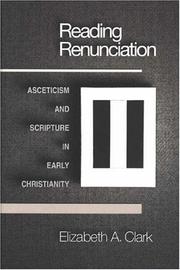
ISBN: 0691005117 0691005125 1400823188 1282753770 9786612753770 1400811244 9781400823185 1400801230 9780691005126 1400801222 9781400801220 9781400801237 9781282753778 9781400811243 Year: 1999 Publisher: Princeton, N.J. : Princeton University Press,
Abstract | Keywords | Export | Availability | Bookmark
 Loading...
Loading...Choose an application
- Reference Manager
- EndNote
- RefWorks (Direct export to RefWorks)
A study of how asceticism was promoted through Biblical interpretation, Reading Renunciation uses contemporary literary theory to unravel the writing strategies of the early Christian authors. Not a general discussion of early Christian teachings on celibacy and marriage, the book is a close examination, in the author's words, of how "the Fathers' axiology of abstinence informed their interpretation of Scriptural texts and incited the production of ascetic meaning." Elizabeth Clark begins with a survey of scholarship concerning early Christian asceticism that is designed to orient the nonspecialist. Section Two is organized around potentially troubling issues posed by Old Testament texts that demanded skillful handling by ascetically inclined Christian exegetes. The third section, "Reading Paul," focuses on the hermeneutical problems raised by I Corinthians 7, and the Deutero-Pauline and Pastoral Epistles. Elizabeth Clark's remarkable work will be of interest to scholars of late antiquity, religion, literary theory, and history.
248 "00/04" --- Asceticism --- -Ascetical theology --- Contempt of the world --- Theology, Ascetical --- Christian life --- Ethics --- Spiritualiteit. Ascese. Mystiek. Vroomheid--?"00/04" --- History --- -Asceticism --- Bible --- Criticism, interpretation, etc. --- Biblia --- Asceticism - History - Early church, ca 30-600 --- Acts of Paul and Thecla. --- Acts of Thomas. --- Adultery. --- Allegory. --- Ambrosiaster. --- Anchorite. --- Apologetics. --- Apostasy. --- Arianism. --- Asceticism. --- Basil of Ancyra. --- Basil of Caesarea. --- Bible. --- Body of Christ. --- Book of Judges. --- Book of Wisdom. --- Celibacy. --- Chastity. --- Christian Order. --- Christianity. --- Church Fathers. --- Clement of Alexandria. --- Clerical celibacy. --- Concupiscence. --- Consummation. --- Contra Celsum. --- Conversion to Christianity. --- Criticism of marriage. --- De fide. --- Dialogue with Trypho. --- Dispensation (canon law). --- Docetism. --- Donatism. --- Elijah. --- Epistle to the Ephesians. --- Evagrius Ponticus. --- Exegesis. --- Ezekiel. --- Fear of God. --- First Epistle to the Corinthians. --- Fornication. --- Gluttony. --- God. --- Helvidius. --- Heresy. --- Heterodoxy. --- Holiness code. --- Idolatry. --- Incest. --- Incorruptibility. --- Indulgence. --- Infidel. --- Jews. --- John Cassian. --- John Chrysostom. --- Jovinian. --- Judaizers. --- Justification (theology). --- Justin Martyr. --- Lactantius. --- Manichaeism. --- Marcion of Sinope. --- Marcionism. --- Matthew 25. --- Melania the Elder. --- Midrash. --- Monasticism. --- Montanism. --- New Testament. --- Old Testament. --- Origen. --- Paganism. --- Parable of the Great Banquet. --- Parable of the Ten Virgins. --- Paulinus of Nola. --- Pelagianism. --- Progressive revelation (Bahá'í). --- Rebuke. --- Religion. --- Religious text. --- Renunciation. --- Rule of Faith. --- Sacramentum (oath). --- Self-denial. --- Sexual Desire (book). --- Sexual abstinence. --- Sirach. --- Sola fide. --- Spiritual marriage. --- Spirituality. --- Spouse. --- Superiority (short story). --- Susanna (Book of Daniel). --- Tertullian. --- The City of God (book). --- Theodore of Mopsuestia. --- Theology. --- Thomas the Apostle. --- Thou shalt not commit adultery. --- Virginity.
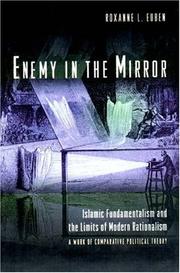
ISBN: 0691058431 069105844X 1282753819 9786612753817 1400823234 140081152X 9781400823239 9780691058443 9780691058436 9781282753815 9781400811526 Year: 1999 Publisher: Princeton, N.J. : Princeton University Press,
Abstract | Keywords | Export | Availability | Bookmark
 Loading...
Loading...Choose an application
- Reference Manager
- EndNote
- RefWorks (Direct export to RefWorks)
A firm grasp of Islamic fundamentalism has often eluded Western political observers, many of whom view it in relation to social and economic upheaval or explain it away as an irrational reaction to modernity. Here Roxanne Euben makes new sense of this belief system by revealing it as a critique of and rebuttal to rationalist discourse and post-Enlightenment political theories. Euben draws on political, postmodernist, and critical theory, as well as Middle Eastern studies, Islamic thought, comparative politics, and anthropology, to situate Islamic fundamentalist thought within a transcultural theoretical context. In so doing, she illuminates an unexplored dimension of the Islamist movement and holds a mirror up to anxieties within contemporary Western political thought about the nature and limits of modern rationalism--anxieties common to Christian fundamentalists, postmodernists, conservatives, and communitarians. A comparison between Islamic fundamentalism and various Western critiques of rationalism yields formerly uncharted connections between Western and Islamic political thought, allowing the author to reclaim an understanding of political theory as inherently comparative. Her arguments bear on broad questions about the methods Westerners employ to understand movements and ideas that presuppose nonrational, transcendent truths. Euben finds that first, political theory can play a crucial role in understanding concrete political phenomena often considered beyond its jurisdiction; second, the study of such phenomena tests the scope of Western rationalist categories; and finally, that Western political theory can be enriched by exploring non-Western perspectives on fundamental debates about coexistence.
Islamic fundamentalism --- Rationalism --- Islamic countries --- Politics and government --- Islamic fundamentalism. --- Rationalism. --- #SBIB:031.IO --- #SBIB:321H91 --- #SBIB:316.331H330 --- Knowledge, Theory of --- Religion --- Belief and doubt --- Deism --- Free thought --- Realism --- Fundamentalism, Islamic --- Islamism --- Islam --- Religious fundamentalism --- Niet-specifieke politieke en sociale theorieën vanaf de 19e eeuw: islam, Arabisch nationalisme --- Godsdienst en politiek: algemeen --- -Muslim countries --- Politics and government. --- Islamic countries - Politics and government --- Alterity. --- Ambiguity. --- Anachronism. --- Anathema. --- Anthropomorphism. --- Anti-Oedipus. --- Anti-Western sentiment. --- Anti-imperialism. --- Antinomy. --- Apologetics. --- Assassination. --- Authoritarianism. --- Clash of Civilizations. --- Communitarianism. --- Criticism. --- Critique of ideology. --- Critique. --- Deductive reasoning. --- Deism. --- Demagogue. --- Despotism. --- Dialectical materialism. --- Dichotomy. --- Dictatorship. --- Disadvantage. --- Disenchantment. --- Emotivism. --- End of history. --- Ethnocentrism. --- Excommunication. --- False consciousness. --- False god. --- God. --- Great Satan. --- Hannah Arendt. --- Heresy. --- Heterodoxy. --- Hostility. --- Hypocrisy. --- Ideology. --- Idolatry. --- Impediment (canon law). --- Imperialism. --- Infidel. --- Injunction. --- Inner-worldly asceticism. --- Irrationality. --- Irreligion. --- Islam. --- Islamic extremism. --- Islamism. --- Islamization of knowledge. --- Jamal ad-Din al-Afghani. --- Jihadism. --- Legitimation crisis. --- Manichaeism. --- Materialism. --- Militarism. --- Modernity. --- Nihilism. --- Obscurantism. --- Oppression. --- Orientalism. --- Overreaction. --- Paradox. --- Political Order in Changing Societies. --- Political alienation. --- Political aspects of Islam. --- Political decay. --- Political philosophy. --- Political prisoner. --- Politics. --- Postmodern philosophy. --- Postmodernism. --- Prejudice. --- Protest vote. --- Qutb. --- Radicalism (historical). --- Radicalization. --- Rashid Rida. --- Reactionary. --- Rebuttal. --- Reformism. --- Religion. --- Seditious conspiracy. --- Separate spheres. --- Separation of church and state. --- Sharia. --- Skepticism. --- Social criticism. --- Sovereignty. --- Spiritual crisis. --- Superstition. --- The End of Ideology. --- Truism. --- Vagueness. --- Vulnerability. --- Wahhabism. --- Yellow Peril.
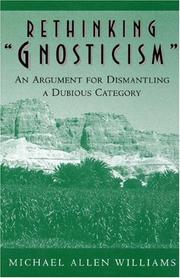
ISBN: 0691005427 0691011273 1400822211 1282753193 9786612753190 1400813832 9781400822218 1400808537 9780691011271 9781400808533 9781282753198 9781400813834 Year: 1996 Publisher: Princeton, N.J. : Princeton University Press,
Abstract | Keywords | Export | Availability | Bookmark
 Loading...
Loading...Choose an application
- Reference Manager
- EndNote
- RefWorks (Direct export to RefWorks)
Most anyone interested in such topics as creation mythology, Jungian theory, or the idea of "secret teachings" in ancient Judaism and Christianity has found "gnosticism" compelling. Yet the term "gnosticism," which often connotes a single rebellious movement against the prevailing religions of late antiquity, gives the false impression of a monolithic religious phenomenon. Here Michael Williams challenges the validity of the widely invoked category of ancient "gnosticism" and the ways it has been described. Presenting such famous writings and movements as the Apocryphon of John and Valentinian Christianity, Williams uncovers the similarities and differences among some major traditions widely categorized as gnostic. He provides an eloquent, systematic argument for a more accurate way to discuss these interpretive approaches. The modern construct "gnosticism" is not justified by any ancient self-definition, and many of the most commonly cited religious features that supposedly define gnosticism phenomenologically turn out to be questionable. Exploring the sample sets of "gnostic" teachings, Williams refutes generalizations concerning asceticism and libertinism, attitudes toward the body and the created world, and alleged features of protest, parasitism, and elitism. He sketches a fresh model for understanding ancient innovations on more "mainstream" Judaism and Christianity, a model that is informed by modern research on dynamics in new religious movements and is freed from the false stereotypes from which the category "gnosticism" has been constructed.
Gnosticism. --- Rome --- Religion. --- Gnosticism --- 273.1 --- 273.1 Gnosis. Gnosticisme --- Gnosis. Gnosticisme --- Religion --- Cults --- Rome - Religion --- Against the Galilaeans. --- Agrippa Castor. --- Anchorite. --- Anthropomorphism. --- Anti-Judaism. --- Antinomianism. --- Antipope. --- Apocalypse. --- Apocrypha. --- Apocryphon. --- Apostasy. --- Asceticism. --- Blasphemy. --- Borborites. --- Cainites. --- Catharism. --- Celibacy. --- Cerdo (gnostic). --- Cerinthus. --- Christian Identity. --- Christian fundamentalism. --- Christianity. --- Church Fathers. --- Clement of Alexandria. --- Consubstantiality. --- Contra Celsum. --- Creation myth. --- Demiurge. --- Demonization. --- Dialogue with Trypho. --- Divine Spark. --- Doctrine. --- Elohim. --- Epiphanes (gnostic). --- Epistle to the Laodiceans. --- Ernst Troeltsch. --- Exegesis. --- Exorcism. --- False prophet. --- God. --- Good and evil. --- Gospel of Eve. --- Gospel of Philip. --- Heresy of the Free Spirit. --- Heresy. --- Heterodoxy. --- Holy Book of the Great Invisible Spirit. --- Ideal type. --- Incorruptibility. --- Infidel. --- Irenaeus. --- Jews. --- Judaism. --- Judas Iscariot. --- Justification (theology). --- Justin Martyr. --- Manichaeism. --- Marcion of Sinope. --- Marcionism. --- Martyr. --- Metempsychosis. --- New religious movement. --- Nicolaism. --- Orthodox Judaism. --- Plotinus. --- Predestination. --- Problem of evil. --- Pseudo-Philo. --- Puritans. --- Pythagoreanism. --- Reform Judaism. --- Religious text. --- Renunciation. --- Sacred prostitution. --- Satan. --- Sect. --- Secularization. --- Self-denial. --- Sethianism. --- Sexual Desire (book). --- Sexual abstinence. --- Simon Magus. --- Skepticism. --- Sophia (Gnosticism). --- Spiritual marriage. --- Spirituality. --- Superiority (short story). --- Tertullian. --- The Other Hand. --- Theodicy. --- Theodotus of Byzantium. --- Theology. --- Thou shalt not commit adultery. --- Thou shalt not covet. --- Tractate. --- Wickedness. --- Writing. --- Zostrianos.
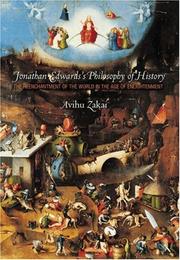
ISBN: 0691096546 0691144303 1400825601 9786612087745 1282087746 9781400825608 9780691096544 9781282087743 Year: 2003 Publisher: Princeton, N.J. : Princeton University Press,
Abstract | Keywords | Export | Availability | Bookmark
 Loading...
Loading...Choose an application
- Reference Manager
- EndNote
- RefWorks (Direct export to RefWorks)
Avihu Zakai analyzes Jonathan Edwards's redemptive mode of historical thought in the context of the Enlightenment. As theologian and philosopher, Edwards has long been a towering figure in American intellectual history. Nevertheless, and despite Edwards's intense engagement with the nature of time and the meaning of history, there has been no serious attempt to explore his philosophy of history. Offering the first such exploration, Zakai considers Edwards's historical thought as a reaction, in part, to the varieties of Enlightenment historical narratives and their growing disregard for theistic considerations. Zakai analyzes the ideological origins of Edwards's insistence that the process of history depends solely on God's redemptive activity in time as manifested in a series of revivals throughout history, reading this doctrine as an answer to the threat posed to the Christian theological teleology of history by the early modern emergence of a secular conception of history and the modern legitimation of historical time. In response to the Enlightenment refashioning of secular, historical time and its growing emphasis on human agency, Edwards strove to re-establish God's preeminence within the order of time. Against the de-Christianization of history and removal of divine power from the historical process, he sought to re-enthrone God as the author and lord of history--and thus to re-enchant the historical world. Placing Edwards's historical thought in its broadest context, this book will be welcomed by those who study early modern history, American history, or religious culture and experience in America.
Enlightenment --- Lumières (Philosophie) --- Lumières [Siècle des ] --- Siècle des Lumières --- Verlichting (Filosofie) --- Enlightenment. --- History --- Aufklärung --- Eighteenth century --- Philosophy, Modern --- Rationalism --- History, Modern --- Philosophy. --- Philosophy --- Edwards, Jonathan, --- أدوردس، يوناثان --- Edwards, Jonathan --- Contributions in history of philosophy --- Antichrist. --- Apostasy. --- Arianism. --- Arminianism. --- Calvinism. --- Christ. --- Christian Church. --- Christian ethics. --- Christian revival. --- Christian theology. --- Christian. --- Christianity. --- Christocentric. --- Christology. --- Church Fathers. --- Constantine the Great and Christianity. --- Consummation. --- Contingency (philosophy). --- Conversion of the Jews. --- Cotton Mather. --- Deism. --- Deity. --- Disenchantment. --- Divination. --- Divine grace. --- Divine providence. --- Doctrine. --- Dynamism (metaphysics). --- Early modern period. --- Eschatology. --- Ethics. --- First Great Awakening. --- George Whitefield. --- God. --- Good and evil. --- Great Awakening. --- Great chain of being. --- H. Richard Niebuhr. --- Herbert Butterfield. --- Heresy. --- Historical criticism. --- Historiography. --- Ideology. --- Illustration. --- Immanence. --- Infidel. --- John Calvin. --- John Foxe. --- Justification (theology). --- Major religious groups. --- Manifestation of God. --- Materialism. --- Mechanical philosophy. --- Methodism. --- Millennialism. --- Miracle. --- Morality. --- Natural philosophy. --- Natural religion. --- Natural theology. --- Old Testament. --- Omnipotence. --- Omniscience. --- Orthodoxy. --- Pastor. --- Perry Miller. --- Philip Melanchthon. --- Philosopher. --- Philosophical theology. --- Philosophy of history. --- Pietism. --- Piety. --- Plan of salvation (Latter Day Saints). --- Postmillennialism. --- Potentiality and actuality. --- Prophecy. --- Protestantism. --- Puritans. --- Religion. --- Religious conversion. --- Religious experience. --- Religious text. --- Sacred history. --- Salvation History. --- Satan. --- Second Coming. --- Second Great Awakening. --- Secularization. --- Sermon. --- Sinners in the Hands of an Angry God. --- Socinianism. --- Teleology. --- The City of God (book). --- Theology of the Cross. --- Theology. --- Theory. --- Universal history. --- World. --- Writing.
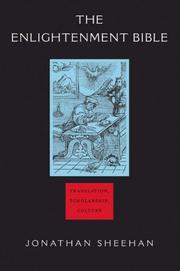
ISBN: 9780691130699 0691130698 0691118876 1400847796 9781400847792 9780691118871 Year: 2005 Publisher: Princeton, New Jersey : Princeton University Press,
Abstract | Keywords | Export | Availability | Bookmark
 Loading...
Loading...Choose an application
- Reference Manager
- EndNote
- RefWorks (Direct export to RefWorks)
How did the Bible survive the Enlightenment? In this book, Jonathan Sheehan shows how Protestant translators and scholars in the eighteenth century transformed the Bible from a book justified by theology to one justified by culture. In doing so, the Bible was made into the cornerstone of Western heritage and invested with meaning, authority, and significance even for a secular age. The Enlightenment Bible offers a new history of the Bible in the century of its greatest crisis and, in turn, a new vision of this century and its effects on religion. Although the Enlightenment has long symbolized the corrosive effects of modernity on religion, Sheehan shows how the Bible survived, and even thrived in this cradle of ostensible secularization. Indeed, in eighteenth-century Protestant Europe, biblical scholarship and translation became more vigorous and culturally significant than at any time since the Reformation. From across the theological spectrum, European scholars--especially German and English--exerted tremendous energies to rejuvenate the Bible, reinterpret its meaning, and reinvest it with new authority. Poets, pedagogues, philosophers, literary critics, philologists, and historians together built a post-theological Bible, a monument for a new religious era. These literati forged the Bible into a cultural text, transforming the theological core of the Judeo-Christian tradition. In the end, the Enlightenment gave the Bible the power to endure the corrosive effects of modernity, not as a theological text but as the foundation of Western culture.
Enlightenment.
---
Siècle des lumières
---
Bible.
---
History.
---
-Enlightenment.
---
Aufklärung
---
Eighteenth century
---
Philosophy, Modern
---
Rationalism
---
Bible
---
History
---
Enlightenment
---
#GGSB: Exegese
---
22.06 <09>
---
Bijbel: exegese--
Book
ISBN: 0691240949 Year: 2023 Publisher: Princeton : Princeton University Press,
Abstract | Keywords | Export | Availability | Bookmark
 Loading...
Loading...Choose an application
- Reference Manager
- EndNote
- RefWorks (Direct export to RefWorks)
"A groundbreaking new history of the shared legacy of expulsion among Jews and Christian moneylenders in late medieval Europe Beginning in the twelfth century, Jewish moneylenders increasingly found themselves in the crosshairs of European authorities, who denounced the evils of usury as they expelled Jews from their lands. Yet Jews were not alone in supplying coin and credit to needy borrowers. Across much of Western Europe, foreign Christians likewise engaged in professional moneylending, and they too faced repeated threats of expulsion from the communities in which they settled. No Return examines how mass expulsion became a pervasive feature of European law and politics-with tragic consequences that have reverberated down to th e present. Drawing on unpublished archival evidence ranging from fiscal ledgers and legal opinions to sermons and student notebooks, Rowan Dorin traces how an association between usury and expulsion entrenched itself in Latin Christendom from the twelfth century onward. Showing how ideas and practices of expulsion were imitated and repurposed in different contexts, he offers a provocative reconsideration of the dynamics of persecution in late medieval society. Uncovering the protean and contagious nature of expulsion, No Return is a panoramic work of history that offers new perspectives on Jewish-Christian relations, the circulation of norms and ideas in the age before print, and the intersection of law, religion, and economic life in premodern Europe"-- "Beginning in the twelfth century, Jewish moneylenders increasingly found themselves in the crosshairs of European authorities, who denounced the evils of usury as they expelled Jews from their lands. Yet Jews were not alone in supplying coin and credit to needy borrowers. Across much of Western Europe, foreign Christians likewise engaged in professional moneylending, and they too faced repeated threats of expulsion from the communities in which they settled. No Return examines how mass expulsion became a pervasive feature of European law and politics-with tragic consequences that have reverberated down to the present. Drawing on unpublished archival evidence ranging from fiscal ledgers and legal opinions to sermons and student notebooks, Rowan Dorin traces how an association between usury and expulsion entrenched itself in Latin Christendom from the twelfth century onward. Showing how ideas and practices of expulsion were imitated and repurposed in different contexts, he offers a provocative reconsideration of the dynamics of persecution in late medieval society. Uncovering the protean and contagious nature of expulsion, No Return is a panoramic work of history that offers new perspectives on Jewish-Christian relations, the circulation of norms and ideas in the age before print, and the intersection of law, religion, and economic life in premodern Europe"--
Jews --- Exile (Punishment) --- Usury --- Persecutions --- Religious aspects. --- Aaron of Lincoln. --- Abbess. --- Abeyance. --- Accrual. --- Advocatus. --- Antipathy. --- Attempt. --- Auvergne. --- Auxerre. --- Bishop of London. --- Boppard. --- Chaplain. --- Civil disobedience. --- Cleric (Dungeons & Dragons). --- Clerical Discipline. --- Competent authority. --- Consent. --- Consideration. --- Constitution. --- Constitutions of Clarendon. --- Contract. --- County of Burgundy. --- Credit (finance). --- Decree. --- Dissemination. --- Divine grace. --- Duke of Brabant. --- Economic ethics. --- Exchequer of the Jews. --- Excommunication. --- Exemption (church). --- Exile. --- Fasting. --- Foligno. --- Forced migration. --- Gospel. --- Governance. --- Grandparent. --- Green library. --- Harassment. --- Heresy. --- High Middle Ages. --- Hildesheim. --- Homily. --- Hostility. --- I Wish (manhwa). --- Infidel. --- Intestacy. --- Ketuvim. --- Lateran. --- Lecture. --- Legal Legitimacy. --- Lombards. --- Majesty. --- Mark Granovetter. --- Medieval Latin. --- Merovingian dynasty. --- Modern English. --- Moneylender. --- Mont Saint-Michel. --- Northern Europe. --- Outlaw. --- Papal States. --- Persecution. --- Pessimism. --- Peter the Venerable. --- Petition to the King. --- Philip VI of France. --- Poetry. --- Political economy. --- Politician. --- Pope Alexander II. --- Pope Gregory I. --- Presumption (canon law). --- Pretext. --- Privilegium Maius. --- Promulgation. --- Provision (accounting). --- Reims. --- Religious community. --- Religious identity. --- Result. --- Richard Landes. --- Righteousness. --- Ruler. --- Safeguarding. --- Sally Falk Moore. --- Saving. --- Self-interest. --- Sources of law. --- Sovereignty. --- Status quo. --- Statute of the Jewry. --- Statute. --- Tallage. --- Target audience. --- Tropological reading. --- University of Pennsylvania Press. --- Usury. --- Writing.
| Listing 1 - 9 of 9 |
Sort by
|

 Search
Search Feedback
Feedback About UniCat
About UniCat  Help
Help News
News